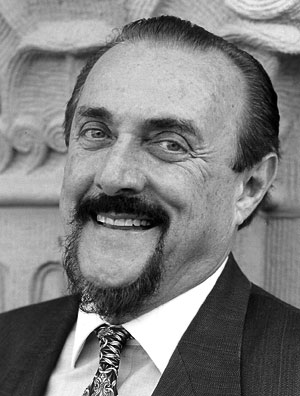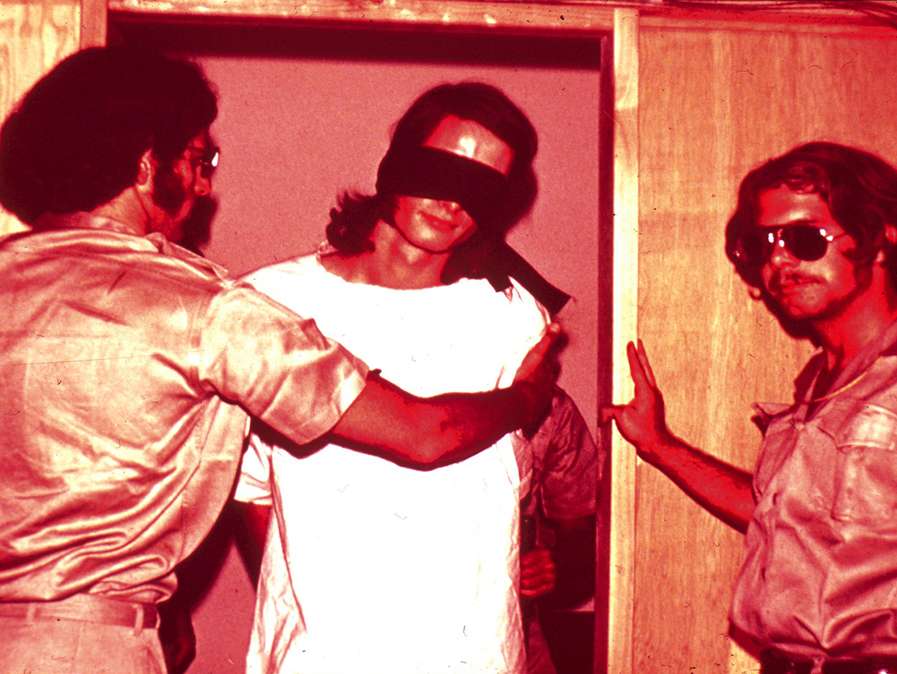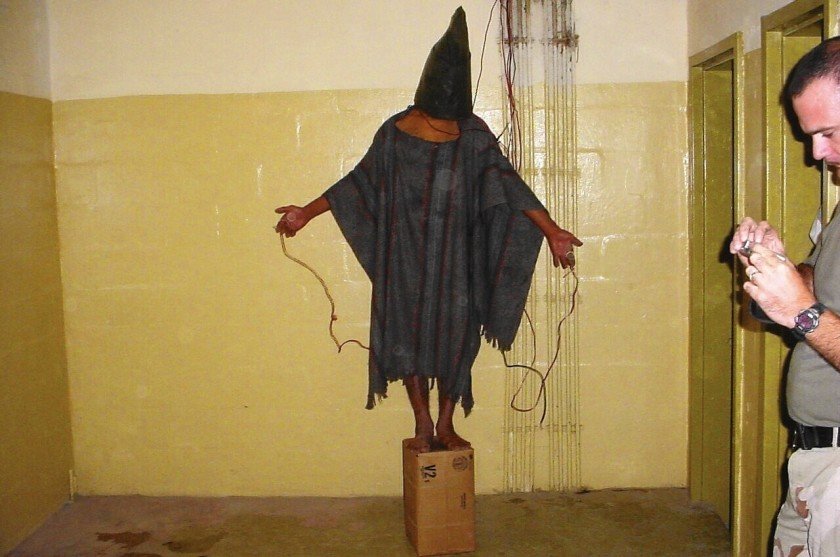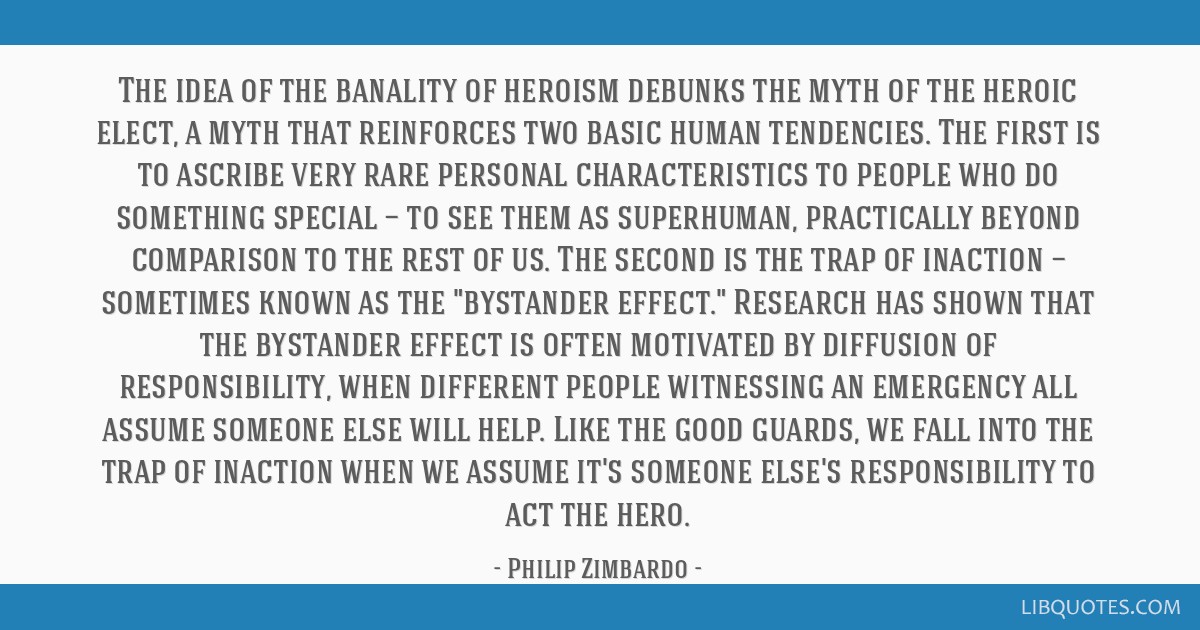Philip Zimbardo
How Good People Are Transformed into Perpetrators Of Evil
5 Lessons From The Stanford Prison "Experiment"

Introduction To Philip Zimbardo
Philip Zimbardo is a
psychologist and professor emeritus at Stanford University, where he
started teaching in 1968 and has taught for over 50 years, and continues to conduct research.
His profile on the the American Psychological Association shows that:
"He has authored more than 300 professional articles, chapters and books representing his broad and varied interests in topics ranging from exploratory and sexual behavior in rats to persuasion, dissonance, hypnosis, cults, shyness, time perspective, prisons and madness"
His books and textbooks for college students include “Psychology and Life,” “The Lucifer Effect: Understanding How Good People Turn Evil” and “The Time Paradox.”
Philip Zimbardo is a dedicated educator who has dedicated 50+ years to continued lecturing, teaching and mentoring and for which he has earned a well deserved reputation.
He is a social activist and has championed prison reform and other causes thoughout his career.
In this and the acompanying articles on Stanford Prison Experiment [SPE] and The Lucifer Effect I am critical of some of his work.
Before undertaking the research in preparation of these articles I had always held Philip Zimbardo in the highest regard and in many ways I still do, but I have to say that I was shocked and dismayed by what I found when I examined the public domain information on the SPE and his much later follow up book prompted in no small measure by the Abu Ghraib atrocities.
As a direct consequence of this research and review of the available material, I can only present in truth what I have found.
Not withstanding my observations and commentary on these subjects I still believe Philip Zimbardo to be an extraordinary man and an honorable man. I also believe he has contributed much to our understanding of the situational dynamics of how ordinary people can react when experiencing extreme pressure to do the wrong thing, although with regard to the SPE this contribution may not now be seen in the way in which he originally intended.
For a very interesting insight into the man, his early years and formative experiences that have shaped his research and career I commend this interview he gave to Dr George M. Slavich of the University of California in 2009:
On 50 Years of Giving Psychology Away: An Interview With Philip Zimbardo
In his own words Philip Zimbardo explains how his early life and the tough environment in which he grew up shaped and influenced his adoption of a situationist perspective: "My bias is admittedly more toward situational analyses of behavior, which comes both from my training as an experimental social psychologist, and also from having grown up in poverty in a New York City ghetto of the South Bronx. I believe that dispositional orientations are more likely to correlate with affluence, since the rich want to take full credit for their success, while situationists arise more from the lower classes who want to explain away -- onto external circumstances -- the obvious dysfunctional life styles of those around them. But I am primarily concerned with understanding the psychological and social dynamics involved when an ordinary, "good" person begins to act in anti-social ways, and in the extreme, behaves destructively toward the property or person of other people. I have seen first hand my childhood friends go through such transformations, and always wondered how and why they did, and whether I could also change like that. I was similarly fascinated with the behavioral transformation tale of Robert Louis Stevenson’s good Dr. Jekyll into the murderous Mr. Hyde. What was in his chemical formula that could have such an immediate and profound impact?"
Philip Zimbardo - Early Influences On The Adoption Of A Situationist Perspective
Philip Zimbardo's comments above are taken from a detailed and fascinating chapter that he contributed to a chapter in: "The social psychology of good and evil: Understanding our capacity for kindness and cruelty". [Arthur Miller. New York: Guilford. Publication date: 2004].
In the abstract to this article/chapter Zimbardo sets out his stall:
"I endorse a situationist perspective on the ways in which anti-social behavior by individuals, and of violence sanctioned by nations, is best understood, treated and prevented.
Unique to this situationist approach is using experimental laboratory and field research as demonstrations of vital phenomena that other approaches only analyze verbally or rely on archival or correlational data for answers.
The
basic paradigm to be presented illustrates the relative ease with which
"ordinary," good men and women are induced into behaving in evil ways by
turning on or off one or another social situational variable."
He states that his view of the situationist perspective is grounded in:
- Laboratory and field studies on deindividuation, aggression, vandalism, and of course the Stanford Prison Experiment
- A process analysis of Milgram's obedience studies
- Bandura's analysis of “moral disengagement”
- The evil of inaction by considering bystander failures of helping those in distress.
He proposes that:
"This
body of research demonstrates the under-recognized power of social
situations to alter the mental representations and behavior of
individuals, groups and nations. "
...and concludes:
"Finally, I explore extreme
instances of “evil” behavior for their dispositional or situational
foundations – torturers, death squad violence workers and terrorist
suicide-bombers."
You can download this article in full in PDF format:
The now world-famous Stanford Prison Experiment [SPE] prison simulation study to demonstrate the power of social situation to influence people's behaviour. The study had to be terminated after
only six days - of a scheduled 14 days - because allegedly the behaviour of the participants role-playing prison guards got completely out of hand leading to several distressing outcomes and the alleged emotional and psychological breakdown of some of the participants The Greatest Showman Philip Zimbardo has established a fine and well deserved reputation as a researcher and an educator and the full spectrum of his research interests are extensive. But it is this now infamous study which made his name and brought him into wider media and public consciousness. The narrative and drama of the SPE Study lends itself for popular consumption and this study along with the equally famous Millgram Experiment focusing on obedience to authority figures now ranks as one of, if not the, most talked about social psychological studies. The theme of the SPE study caught the popular mind with the concept that ordinary "good" people can be subverted and perverted into performing acts of evil by the situational forces impacting them and thus in my view providing a convenient and acceptable explanation for what would otherwise be a far more challenging interpretation, namely that we all have an inner heart of darkness. Philip
Zimbardo has a very good run off of the back of the SPE and in many ways it
has been the "gift that keeps on giving" throughout his career. He is a great communicator and has utilised his presentational and
communication gifts to the limit as he has spun the SPE study every
which way over the past 50 years. The SPE study has been reviewed extensively and has to a large extent been debunked. This is a controversial subject and there are extensive resources now in the public domain. In a sense, this study is one of two bookends to his career. The
second bookend is his message of hope espoused in recent years with
his work on heroism and the counter-balance between an evil choice with the choice to act heroically. Thus, the subversion of a
"good" ordinary person through the pressure of situational dynamics can be transmuted by the exercising of a choice to resist the
evil environment and the moral decision to act heroically (for example as a whistle-blower) and thus make a
stand for what is morally right. Abu Ghraib Atrocities and Revisionism in "The Lucifer Effect" In between these two bookends
we have his work on "The Lucifer Effect" in which he discusses more
recently released material from the Stanford Prison Experiment and draws
a direct line between that and the prisoner abuse at Abu Ghraib, in Iraq, in
2003. Zimbardo was an expert witness for Ivan "Chip" Frederick one of the soldiers convicted of prisoner abuse at Abu Ghraib prison Iraq. Zimbardo's testimony was rejected by the judge. I am going to discuss the SPE debunking arguments and the subsequent
revisionism and more contemporary "Lucifer Effect" extrapolations by
Zimbardo in two separate articles:
This
book, published in 2007, which for the first time includes Zimbardo's
full detailed, written account of the events surrounding the 1971
Stanford Prison Experiment including the psychological and social
factors which result in immoral acts
being committed by otherwise moral people. It also includes examination
of the prisoner abuse at Abu Ghraib in 2003 and the subsequent trial at
which he was an expert defence witness for one of the guards. Zimbardo says: "Good people can be induced, seduced, and initiated into behaving in
evil ways. They can also be led to act in irrational, stupid,
self-destructive, antisocial, and mindless ways when they are immersed
in 'total situations' that impact human nature in ways that challenge
our sense of the stability and consistency of individual personality, of
character, and of morality." [The Lucifer Effect, p. 211]
Video [graphic images]: Zimbardo on The Lucifer Effect Further Reading: The Lucifer Effect
The 3 Key Themes Of Philip Zimbardo's Long Career
[1] The Stanford Prison Experiment [1971]

[2] The Lucifer Effect: Understanding How Good People Turn Evil

[3] The Heroic Imagination Project

Philip Zimbardo is also president of the Heroic Imagination Project, which teaches people how to overcome the natural human tendency to watch and wait in moments of crisis.
Commenting in an interview for "The Greater Good" on "The Banality Of Heroism" Zimbardo reflects:
"...because evil is so fascinating, we have been obsessed with focusing upon and analyzing evildoers.
Perhaps because of the tragic experiences of the Second World War, we have neglected to consider the flip side of the banality of evil: Is it also possible that heroic acts are something that anyone can perform, given the right mind-set and conditions?
Could there also be a “banality of heroism”?
The banality of heroism concept suggests that we are all potential heroes waiting for a moment in life to perform a heroic deed.
The decision to act heroically is a choice that many of us will be called upon to make at some point in time.
By conceiving of heroism as a universal attribute of human nature, not as a rare feature of the few “heroic elect,” heroism becomes something that seems in the range of possibilities for every person, perhaps inspiring more of us to answer that call."
Further Reading - Download PDF: The Banality Of Heroism
How Does Philip Zimbardo's Work Align With The Themes Of This Site?
I believe that Philip Zimbardo has contributed greatly to our understanding of the situationist perspective as to why people can change and choose to exercise bad/evil behaviour in response to the pressures and demands of the environment upon them. For this reason alone, I personally regard him as an inspirational person.
Directly, and more indirectly, the revised understanding of the Stanford Prison Experiment further expands the situationist perspective.
In his subsequent analysis of SPE in The Lucifer Effect Zimbardo challenged the prevailing systemic view that this bad behaviour is just the result of a few "bad apples in the barrel" and suggests that it is the "barrel" itself that is the problem.
He then expands this idea and suggests that responsibility and culpability sits with the political and military leaders who he frames as "the barrel makers".
In my analysis of the The Lucifer Effect I have identified a further, and I believe major, additional factor in what affects the choices people make when being impacted by situational factors and that is what I have termed Persons of Direct Influence [PODI].
The relationship between the individual and the PODI can be formal as in the traditional line or matrix management role or informal [i.e. non-official] in the role of mentor, guide or informal leader.
On the basis of the work of Zimbardo (and many others) and from my own lived and observed life experience there is a lot of evidence to suggest that a PODI can significantly influence how the individual frames the circumstance affecting them and the choices made.
Finally, I want to add two further perspectives, both of which relate to the emotional dimension in terms of: firstly, the impact of peer-to-peer "emotional contagion"; and secondly, the impact of "primal leadership" - how the leader's emotions are contagious from the top down and infect the "barrel".
- Social
Contagion - The tidal swirl of other people's emotional
turbulence. Elaine Hatfield Professor of Psychology (University of Hawaii), and co-author of a pioneering academic book Emotional Contagion defines “primitive” emotional contagion as the: “...tendency
to automatically mimic and synchronize facial expressions,
vocalizations, postures, and movements with those of another person and,
consequently, to converge emotionally.”
- Primal Leadership - How a leader's emotions infect an organisation. In 2001 Daniel Goleman introduced the concept of what he termed "Primal leadership" and outlined research that he and his team conducted in a study of 3,871 executives and their direct reports and it showed that the leader’s style determines about 70% of the emotional climate which in turns drives 20-30% of business performance. Daniel Goleman says: "Emotions are contagious, and they are most contagious from the top down, from leader to followers."
Conclusions
The purpose of this site is to show you how to cope in tough times, and to provide you with the tools to do this successfully.
In your experience of tough times there are - or will be - situations where you experience overwhelming pressure to conform and comply with things that are just plain wrong or intrinsically evil.
Philip Zimbardo - Further Recommended Reading On This Site
Yes you can fool most of the people for over 30 years. A masterclass in self deception.
Understanding
how good people do bad things and how persons of direct influence can appeal to
the better angels of our nature, or not....
Return from "Philip Zimbardo" to: Home Page
LATEST ARTICLES
Does Prayer Work? The Psychology of Prayer, Meditation and Outcomes
 Reality Is A Complex System Of Countless Interactions - Including Yours. So does prayer work? The problem is that the question itself is usually framed in a way that guarantees confusion. We tend to a…
Reality Is A Complex System Of Countless Interactions - Including Yours. So does prayer work? The problem is that the question itself is usually framed in a way that guarantees confusion. We tend to a…Living in Survival Mode Without Surrendering Mental Authority
Living in Survival Mode Without Surrendering Mental Authority
 Clear Thinking When You’re Just Trying to Stay Afloat. Many people today are overwhelmed because they are living in survival mode - not temporarily, but as a persistent condition of life. For many, th…
Clear Thinking When You’re Just Trying to Stay Afloat. Many people today are overwhelmed because they are living in survival mode - not temporarily, but as a persistent condition of life. For many, th…Manifestation Without Magic: A Practical Model
 Manifestation without magic is not a softer or more intellectual version of popular manifestation culture. It is a different model altogether. Popular manifestation teachings tend to frame reality as…
Manifestation without magic is not a softer or more intellectual version of popular manifestation culture. It is a different model altogether. Popular manifestation teachings tend to frame reality as…Staying Committed When You Can't See Progress - The Psychology of Grit
 Uncertainty Is Not The Absence Of Progress, Only The Absence Of Reassurance. One of the most destabilising experiences in modern life is not failure, but uncertainty and staying committed when you can…
Uncertainty Is Not The Absence Of Progress, Only The Absence Of Reassurance. One of the most destabilising experiences in modern life is not failure, but uncertainty and staying committed when you can…The Battle For Your Mind - How To Win Inner Freedom In A Digital Age Of Distraction
 From External Events to Inner Events. We often think of “events” as things that happen out there: the traffic jam, the rude comment, the delayed email reply. But what truly shapes our experience is wh…
From External Events to Inner Events. We often think of “events” as things that happen out there: the traffic jam, the rude comment, the delayed email reply. But what truly shapes our experience is wh…How to See Your Thoughts Without Becoming the Story
 A Practical Guide to Thought-Awareness. You can spend your life inside the stories of your mind without ever learning how to see your thoughts clearly and objectively. Most of the stuff we tell oursel…
A Practical Guide to Thought-Awareness. You can spend your life inside the stories of your mind without ever learning how to see your thoughts clearly and objectively. Most of the stuff we tell oursel…The Collison Decision Matrix - A Simple Framework for Better Choices
 The Collison Decision Matrix Is A Practical Everyday Thinking Tool. Most of us spend a surprising amount of time worrying about decisions. From small ones such as what to wear, what to eat, what to te…
The Collison Decision Matrix Is A Practical Everyday Thinking Tool. Most of us spend a surprising amount of time worrying about decisions. From small ones such as what to wear, what to eat, what to te…The Power Of Asking The Right Question
 The Power Of Asking The Right Question Lies In The Quest For Insight. To experience the power of asking the right question you must develop the practice of asking questions. The best way to improve th…
The Power Of Asking The Right Question Lies In The Quest For Insight. To experience the power of asking the right question you must develop the practice of asking questions. The best way to improve th…Site Pathways
 Here is a site pathway to help new readers of Zen-Tools navigate the material on this site. Each pathway is based around one of the many key themes covered on this site and contain a 150 word introduc…
Here is a site pathway to help new readers of Zen-Tools navigate the material on this site. Each pathway is based around one of the many key themes covered on this site and contain a 150 word introduc…How To Live With Contradiction - Beyond Thought Let Stillness Speak
 A major impact on so many peoples' lives is the situational contradiction of unfilled realistic expectations. So where does all this leave us? Well here we are, with mental equipment that is more lim…
A major impact on so many peoples' lives is the situational contradiction of unfilled realistic expectations. So where does all this leave us? Well here we are, with mental equipment that is more lim…How To Trust The Process Of Mindfulness - Right Now
 In mindfulness, the process isn’t some distant goal — it's what is happening right now. When we talk about how to trust the process of mindfulness the credibility of the process is heavily dependent…
In mindfulness, the process isn’t some distant goal — it's what is happening right now. When we talk about how to trust the process of mindfulness the credibility of the process is heavily dependent…